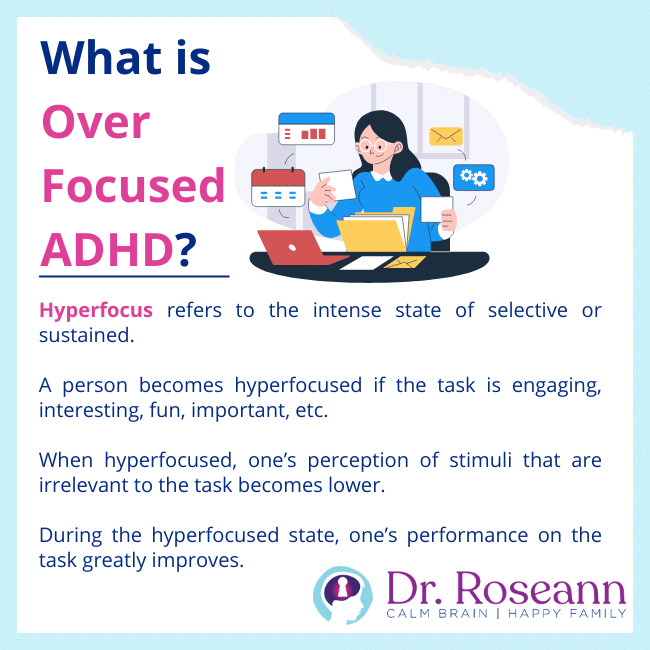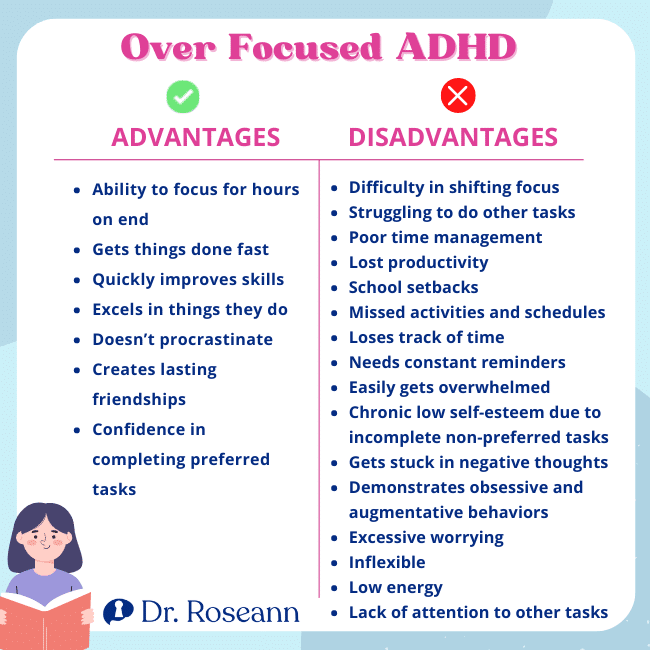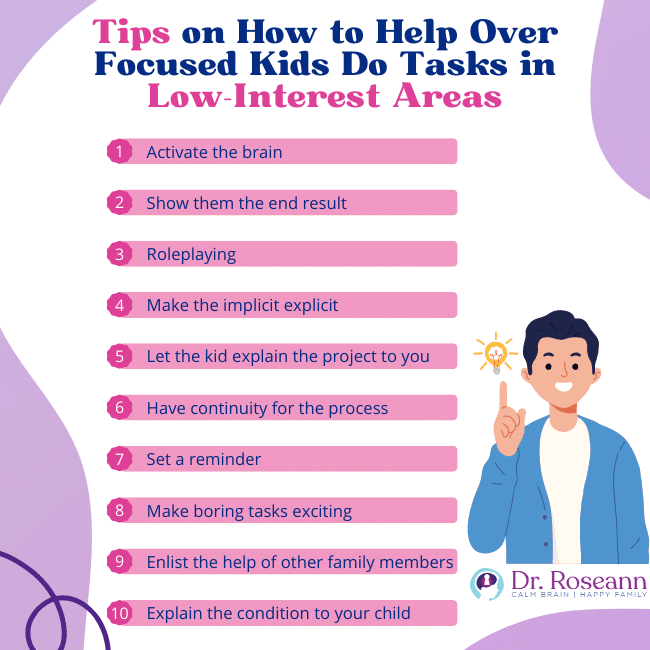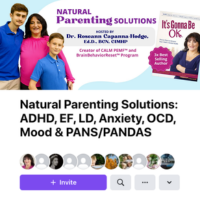Over Focused ADHD: What Does it Mean to Hyperfocus?
Being over focused ADHD can be a superpower and an Achilles' heel for a child with Attention-Deficit Hyperactivity Disorder. A child or teen (or adult) with this type of hyperfocusing ADHD has the ability to have an intense focus on a preferred task more than a neurotypical peer because their brain suffers from under stimulation. So when their brain gets stimulation from something it enjoys, they can overfocus or hyper focus on the activity.
Children with Attention-Deficit Hyperactivity Disorder. struggle to pay attention to boring or less preferred items. But when they find something stimulating and enjoyable, the brain activity of these kids has the ability to hyperfocus on one task at the exclusion of everything else.
It makes me think of Jimmy who could focus on his video games even if you offered him a million dollars to stop. His parents were so mad at him because he could focus on what he enjoyed but never could manage to write more than a paragraph without a screaming match. That is the over focused ADHD brain.
Your doctor may not have told you about over focused ADHD symptoms but if you are reading this, you probably already know a lot about it because you are living with it!
What is Over Focused ADHD?
One study tried to fully understand what hyper focused ADHD is, as this phenomenon was due for a deeper investigation as it can be different from classic ADHD. The researchers came up with these testable definitions:
- Hyperfocus refers to the intense state of selective or sustained attention.
- A person becomes hyperfocused if the task is engaging, interesting, fun, important, etc.
- When hyperfocused, one's perception of stimuli that are irrelevant to the task becomes lower.
- During the hyperfocused state, one's performance on the task dramatically improves.
The researchers also discovered that the hyperfocus experienced by children with ADHD and autism is similar (Ashinoff & Abu-Akel, 2019). That means both ADHD and autistic brains are prone to intense periods of almost unbreakable concentration with preferred, high-interest tasks.
Practical Examples of Over Focused ADHD
Think of it this way. The house could be burning down but a hyperfocused child that is doing something that they love, like reading a book, building Lego, doing a science project, or playing an instrument would continue what they're doing.
Their minds wouldn't even register the danger they're in because they're so locked in. They can get so deep into the task that nothing can break them away from it. When something is very interesting for children with ADHD, their brain gets a level of stimulation that they don't easily or ever get with mundane tasks.
Let's say a child with ADHD has a musical interest. They may be able to compose a whole concierto because they are so focused on playing their instrument and want to spend their whole time on it. It's so stimulating for them.
But on the flip side, when the task is boring or of low interest, it is tough to get and ADHD overfocused person to initiate the task or stay engaged. Unfortunately for most with over focused ADHD, academic tasks, especially daily written tasks, usually aren't very stimulating. Let's learn more about its advantages and disadvantages.
I had a case, Eric, who had a real love of reading. Eric could do other activities, like playing a sport. In fact, he is part of a team. He has great social skills, was well-liked, and could get along with other kids. However, if he was given the choice to do what he wants to do, he'd choose reading. He had piles of books at home and would go from one book to the next. He had a very wide knowledge of almost everything because he was a voracious reader.
But his parents were very concerned about this, as they had to pull him out of reading to do other activities. Ultimately, he was missing out on a lot and if his parents didn't “drag” him out of his reading, he would let the world pass him by.
By the time the family got to me, his mom was extremely worried about Eric. We were able to help Eric by helping him with transitions and giving his parents the right words and resources to help him alert differently. We helped him set alarms and follow schedules so he can be a well-rounded individual. Eric has been doing great to this day.
Advantages of Over Focused ADD and ADHD
It's no surprise that being hyperfocused has many advantages if you channel it right, which is why it's sometimes referred to as a superpower. Here's what you can observe from a child with over focused ADHD:
- Ability to focus for hours on end
- Gets things done fast
- Quickly improves skills
- Excels in things they do
- Doesn't procrastinate
- Creates lasting friendships
- Confidence in completing preferred tasks
Disadvantages of Over Focused ADHD
While hyperfocused ADHD has many advantages, it has disadvantages as well. It can be a major source of stress at home and a point of conflict between a child and their parents. Parents struggle to understand how a child's or teen's attention to a task they like is almost unbreakable but why they can't do daily more mundane tasks.
You are just looking for ways to help your child with ADHD but may feel stuck. Understanding the ADHD brain is critical in knowing that your child isn't doing this on purpose but at the same time there are parenting hacks that can better support their brain.
Here are some of its negatives:
- Difficulty in shifting focus
- Struggling to do other tasks
- Poor time management
- Lost productivity
- School setbacks
- Missed activities and schedules
- Loses track of time
- Needs constant reminders
- Easily gets overwhelmed
- Chronic low self-esteem due to incomplete non-preferred tasks
- Gets stuck in negative thoughts
- Demonstrates obsessive and augmentative behaviors
- Excessive worrying
- Inflexible
- Low energy
- Lack of attention to other tasks
Having overfocused ADD is not a bad thing at all. In fact, it can be your child's very special gift that may have a positive effect on their chosen career in the future. That is why understanding your child's brain and what it can do easily and not so easily is important. It is all about harnessing this ability and managing their brain function so that they can also focus on less interesting but equally important tasks.
Tips on How to Help Over Focused Kids Do Tasks in Low-Interest Areas
Tips on what you can do to guide your kid that has Overfocused ADHD:
#1 Activate the brain
Use visual and kinesthetic tools, which are the preferred ways the ADHD mind obtains information. Kinesthetic strategies include motion- and activity-based lessons promoting meaningful and deep long-term learning.
In a study conducted among ADHD learners during the COVID-19 pandemic, results pointed out the significance of including kinesthetic learning strategies, particularly dance, theater, and music for elementary school students (Freedman, 2022).
#2 Show them the end result
When kids have a visual of what they need to accomplish, they tend to do better. That is what good executive functioning is all about… seeing the end result first. Teaching them to start with the end result and then work backward is the key to getting stuff done independently.
The ADHD brain struggles with planning and prioritizing tasks so executive functions should be taught and reinforced at a high level.
#3 Roleplaying
Nothing cements learning like actually doing something. Getting the kids to gesture and move around is where to start. Use roleplaying to help them understand the task at hand more. Let the child describe the task using hand movements. We know through neuroscience that those role-playing opportunities are far more likely to be stuck in their brain than stand verbal or visual learning.
#4 Make the implicit explicit
Kids with overfocused ADHD are very smart. Because they are so smart, parents think that they understand all the nuances associated with the task. But then, these kids have very fast brains, and they may be missing steps. So, as parents, make sure that you lay out all parts of the process. When you do, always start with the end and work backward.
#5 Let the kid explain the project to you
After laying out all the steps to the task, make sure that your child or teen understands what the end product looks like and what the key steps are. Let them explain the things that they have to do and why they have to do them. Make sure that they have a 360-degree view of the project.
Make sure that they have your full attention and be very patient, especially if you're explaining things for the first time. Individuals with ADHD often have an initial delay in listening, so it is best to cue them that something important is coming and then wait three to five seconds before you start.
#6 Have continuity for the process
Always check in with your kids and know how they're doing with the project. Don't just give directions and not check-in. Kids with ADHD can easily get lost when completing tasks in low-interest areas. Be sure to adapt the same process for other tasks that they have to do, especially for tasks that aren't within their field of interest.
Parents need to do this and make this conversation every time until the child becomes independent in doing tasks. Then add a little reinforcement. Realize that the ADHD brain needs three times as much reinforcement compared to a typical brain. So, they can get there but just need a little extra practice.
You'll see that the conversations you'll have with your child would shift from a nagging cycle to talking about solutions and strategies around the work.
#7 Set a reminder
Find a way to remind your child that they have other tasks to do. Use a reminder that works for them, such as an app, alarm clock, or calendar. Using markers also helps, like asking them to do something else at the end of a TV show.
Create a schedule for your child and be sure to enforce it. Include the unproductive tasks he tends to hyperfocus on, such as watching movies and playing video games, then restrict them. Set a limit for every task so that your child won't get in too deep.
#8 Make boring tasks exciting
Present “boring” tasks to your child in a different way so they get more interested in doing them. Instead of fighting the overfocused ADHD brain, try to harness your child's potential. Find different ways to entice your kid to do the task and tie it to their high-interest areas.
Be sure that you know what task your child is very interested in and integrate them into tasks that they don't like. For example, if your child doesn't like reading but he's into dinosaurs, give him books related to dinosaurs so he can give them a try.
I recall when my own child was struggling with Lyme and PANS, he just hated writing. Since he loved Science, we tied all his learning into Science and we were able to build writing skills. It is truly remarkable that almost a decade later how much he knows about Science.
Help your child discover other things that may interest them. Try to introduce them to sports, music, and others that promote social interaction. Look for things that prevent them from spending isolated time stuck in their restricted interests. Even crossing over to related interests just to expand what they like to do is a good idea.
#9 Enlist the help of other family members
When it comes to hyperfocus ADHD, you'll need all the help you can get. Other family members should contribute by turning off the TV when it's time, giving them a nudge when it's dinner time, and turning off the lights when it's bedtime.
Help from grandparents and siblings to play games and explore their own interests with a child with ADHD gives them perspective. Since the ADHD brain responds to kinesthetics, action-based activities are more likely to be received and retained.
#10 Explain the condition to your child
Your child may not have an idea that he or she has a problem with overfocusing. Try to let your child what it's like when they are hyper-focused so that they become aware of this particular symptom of ADHD and possibly address their behavior problems. Focusing on ADHD coping skills gives them tools for today and the future.
Getting them to love and celebrate their ADHD brain instead of feeling ashamed or bad about it couldn't be more important for their lifelong mental health. While neurodiversity is an increasing movement, I think neurodiversity is the norm now. All brains are unique and that is exactly why kids need to love every nook and cranny of themselves.
Success comes from self-confidence and self-love and I hope every kid, with or without ADHD, finds that.
Possible Causes of Over Focused ADHD
Over focused ADHD, like distractibility, results when the brain has low serotonin and dopamine levels. These neurotransmitters work actively in the brain and if their levels go down it becomes difficult for the child to shift their gears and do boring but important tasks.
These neurochemical impairments affect the brain's executive functions. As a result, children who are great at paying attention to certain activities that are interesting to them may have a hard time achieving the same focus to do many other tasks, even if they wish or intend to put the same effort into them too.
Genetics may also be a factor. One study shows that if any of the parents or siblings of the child has ADHD, it is likely that the child will have ADHD too. However, inheriting ADHD is not tied to a single gene. It follows a more complex process than inheriting any other trait (Faraone & Larsson, 2018).
The structure of one's brain could contribute to over focused ADHD. There are different studies around this, particularly one that discovered that ADHD symptoms in children are higher in those with micro- and macro-structural brain abnormalities (Gehricke et al., 2017).
There can also be an ADHD fixation on things, or ADHD looping, that gets in the way of day-to-day life. ADHD intrusive thoughts can happen for some when their inner thoughts distracts a person from the task at hand. ADHD and OCD often co-occur but even though thoughts can be affected, OCD is the opposite of ADHD. OCD reflects fear-driven thinking but ADHD is about distracted or hyperfocused thinking. Ruling out anxity and OCD is important when these behaviors are present.
ADHD and rumination also are common, especially for those that have rejection sensivite dysphoria (RSD). There is an ADHD hyperfocus on negative that can cause friction between parent and child. Overfocused depression can also contrinute to rumination.
Children with ADHD also have a clear brainwave pattern that reflects too many unfocused brainwaves and too few focused brainwaves. These children do so well with neurofeedback because it is designed to change brainwave activity through a safe and effective process based on operant conditioning.
Exploring the Three Types of ADHD: Spotlight on Type 3 ADHD
ADHD, a complex condition, is broadly categorized into three types of ADHD, each with distinct characteristics and ADHD symptoms. The first is the Predominantly Inattentive Type, marked by difficulties in maintaining attention and organization. The second is the Predominantly Hyperactive-Impulsive Type, characterized by hyperactivity and impulsive behaviors. The third category, the Combined Type, displays a mix of inattentive and hyperactive-impulsive symptoms.
When discussing Type 3 ADHD, it's important to note that this isn't an officially recognized category in medical literature. Instead, Type 3 ADHD overfosued is a colloquial term often used to describe unique or less common ADHD symptoms that don't precisely fit the traditional categories. This term emphasizes the complexity and variability of ADHD, highlighting the need for personalized approaches in treatment and management.
Understanding these three types of ADHD, including the nuances of Type 3 ADHD, is key to effective management and treatment, acknowledging that ADHD manifests uniquely in each individual.
There are different treatments for over focused ADHD, particularly one that supports natural ADHD solutions. While mental health professionals may recommend an ADHD medication, ADHD supplments and a magnesium supplement may be used in place for a more holistic treatment without the side effects.
As noted earlier, Neurofeedback is also a great treatment therapy for children with over focused ADHD. We provide neurofeedback in our Ridgefield, CT Neurofeedback clinic and remotely all over the world to help manage the common symptoms of ADHD among kids. We combine this with behavioral therapy in our BrainBehaviorReset™ Program to help kids listen better, start and complete tasks more easily, and get off the grade rollercoaster. Magnesium and neurofeedback are natural and effective replacements for stimulant medication.
As your child and teen mental health care provider, we recommend alternative treatment options backed by scientific evidence that will effectively help kids and families. The first step is to accurately assess the issues, create a care plan, and find the best way to support your child based on their needs and strengths, which is what we do in our program.
Citation
Ashinoff, B. K., & Abu-Akel, A. (2019). Hyperfocus: the forgotten frontier of attention. Psychological Research, 85(1). https://doi.org/10.1007/s00426-019-01245-8
Faraone, S. V., & Larsson, H. (2018). Genetics of attention deficit hyperactivity disorder. Molecular Psychiatry, 24(4), 562–575. https://doi.org/10.1038/s41380-018-0070-0
Freedman, C. (2022). Dominican Scholar Dominican Scholar Lessons Learned: Kinesthetic Learning and Engaging Students Lessons Learned: Kinesthetic Learning and Engaging Students with ADHD (in the Time of COVID). https://doi.org/10.33015/dominican.edu/2022.EDU.01
Gehricke, Jean-G., Kruggel, F., Thampipop, T., Alejo, S. D., Tatos, E., Fallon, J., & Muftuler, L. T. (2017). The brain anatomy of attention-deficit/hyperactivity disorder in young adults – a magnetic resonance imaging study. PLOS ONE, 12(4), e0175433. https://doi.org/10.1371/journal.pone.0175433or
Always remember… “Calm Brain, Happy Family™”
Are you looking for SOLUTIONS for your struggling child or teen?
Dr. Roseann and her team are all about solutions, so you are in the right place!
There are 3 ways to work with Dr. Roseann:
You can get her books for parents and professionals, including: It’s Gonna Be OK™: Proven Ways to Improve Your Child’s Mental Health, Teletherapy Toolkit™ and Brain Under Attack: A Resource For Parents and Caregivers of Children With PANS, PANDAS, and Autoimmune Encephalopathy.
If you are a business or organization that needs proactive guidance to support employee mental health or an organization looking for a brand representative, check out Dr. Roseann’s media page and professional speaking page to see how we can work together.
Dr. Roseann is a Children’s Mental Health Expert and Licensed Therapist who has been featured in/on hundreds of media outlets including The Mel Robbins Show, CBS, NBC, PIX11 NYC, Today, FORBES, CNN, The New York Times, The Washington Post, Business Insider, Women’s Day, Healthline, CNET, Parade Magazine and PARENTS. FORBES called her, “A thought leader in children’s mental health.”

She coined the terms, “Re-entry panic syndrome” and “eco-anxiety” and is a frequent contributor to media on mental health.
Dr. Roseann Capanna-Hodge has three decades of experience in working with children, teens and their families with attention-deficit hyperactivity disorder (ADHD), autism, concussion, dyslexia and learning disability, anxiety, Obsessive Compulsive Disorder (OCD), depression and mood disorder, Lyme Disease, and PANS/PANDAS using science-backed natural mental health solutions such as supplements, magnesium, nutrition, QEEG Brain maps, neurofeedback, PEMF, psychotherapy and other non-medication approaches.
She is the author of three bestselling books, It’s Gonna Be OK!: Proven Ways to Improve Your Child's Mental Health, The Teletherapy Toolkit, and Brain Under Attack. Dr. Roseann is known for offering a message of hope through science-endorsed methods that promote a calm brain.
Her trademarked BrainBehaviorResetⓇ Program and It’s Gonna be OK!Ⓡ Podcast has been a cornerstone for thousands of parents facing mental health, behavioral or neurodevelopmental challenges.
She is the founder and director of The Global Institute of Children’s Mental Health, Neurotastic™Brain Formulas and Dr. Roseann Capanna-Hodge, LLC. Dr. Roseann is a Board Certified Neurofeedback (BCN) Practitioner, a Board Member of the Northeast Region Biofeedback Society (NRBS), Certified Integrative Mental Health Professional (CIMHP) and an Amen Clinic Certified Brain Health Coach. She is also a member of The International Lyme Disease and Associated Disease Society (ILADS), The American Psychological Association (APA), Anxiety and Depression Association of America (ADAA) National Association of School Psychologists (NASP), International OCD Foundation (IOCDF).
© Roseann-Capanna-Hodge, LLC 2023
Disclaimer: This article is not intended to give health advice and it is recommended to consult with a physician before beginning any new wellness regime. *The effectiveness of diagnosis and treatment vary by patient and condition. Dr. Roseann Capanna-Hodge, LLC does not guarantee certain results.
















